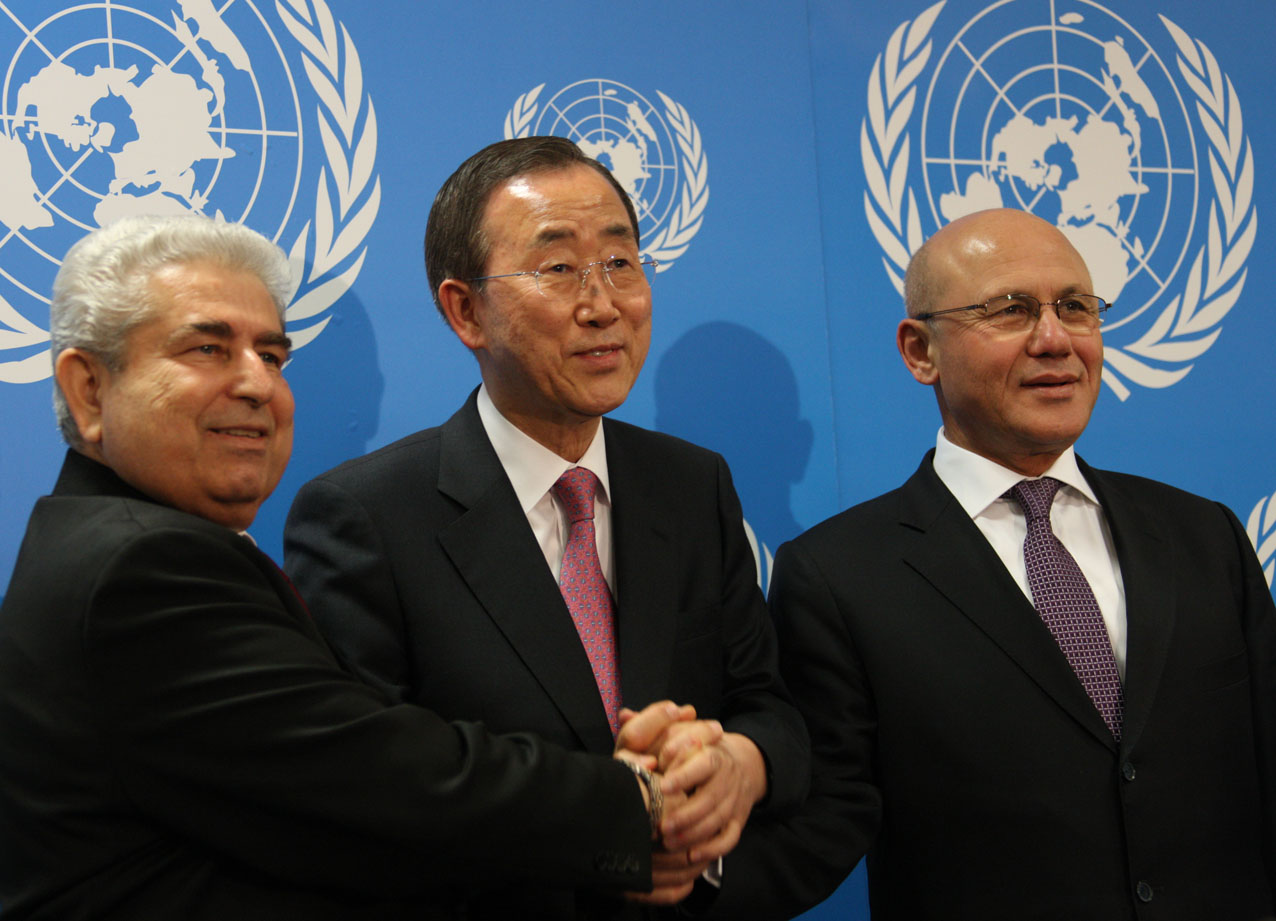THE TWO leaders meet today with UN Secretary-General Ban Ki-moon in New York, kicking off a fifth round of tripartite talks, after leaving Cyprus in a fog of pessimism earlier this week.
The latest round of talks, now in their fourth year, will be held again at the Greentree estate on Long Island, lending them the moniker Greentree 2.
This is the fifth time the UN chief has got personally involved in the talks since 2010, having met the two leaders before, twice in New York and twice in Geneva, in an effort to bring the sides closer to an agreed solution.
According to sources, the two sides have made next to zero progress since the first Greentree meeting in October 2011, begging the question as to what can be expected from yet another round of talks with the UNSG.
The greatest progress made in the intervening period has been the UN getting both sides to submit an outline plan of a preferred solution, which they will likely share with each other at Greentree.
Despite that, one foreign diplomat with knowledge of the talks said there was simply “no momentum” in the process. Greentree 2 has been “written off before it even starts”, he said.
According to a UN source, if one looks at Ban’s assessment after Greentree 1, the two sides are in exactly the same position, with no new convergences on governance, property, territory or citizenship (settlers).
At the time, Ban also referred to the need for both leaders to move forward to the “endgame of negotiations”, resolve the internal aspects of a solution and move to a multilateral conference.
In December, the UN Security Council echoed Ban’s expectation that “all internal aspects of a settlement will have been resolved by then (Greentree 2) so that we can move to a multilateral conference shortly thereafter”.
UN Special Adviser Alexander Downer recently clarified that for the talks to reach a conclusion, an international conference has to be held.
Last Monday, President Demetris Christofias extracted a rare consensus in the National Council by agreeing not to accept arbitration, deadlines or an international conference without all internal aspects being agreed.
Meanwhile, Turkish Cypriot leader Dervis Eroglu has made it clear he will not get into the nitty gritty of territorial adjustments until a multilateral conference is called.
The eternal chicken and egg debate comes to mind.
Earlier this month, Ban sent letters to both leaders undiplomatically pointing out that the talks have reached an “impasse”. He warned that once Cyprus takes over the EU Presidency in July 2012, there will be limited opportunities for the talks to proceed.
International Relations expert Erol Kaymak argues Ban also distanced himself from the precondition of reaching agreement on the internal aspects of a solution before calling a multilateral conference. Instead, he portrayed that condition in the letter as a Greek Cypriot position.
The diplomat said the question of when to call an international conference was a “bit of a grey area” with some arguing the need to complete all internal aspects while others satisfied simply reaching “striking distance” of an internal deal.
So, what are the chances of tying up the internal aspects of an agreement in the coming days, weeks or months in time to hold a multilateral conference and referendums before July?
“In practice this opportunity has vanished,” said the diplomat.
However, with the two sides’ outlines in hand, the UN does have scope to come up with innovative ways to bridge the gaps without actually referring to the word “bridge”. The best case scenario now would be for Greentree 2 to unblock the current impasse in governance, paving the way for property, territory and citizenship to be solved and the calling of a multilateral conference in the coming months.
If all goes well, the two sides reach an agreement by July which they sit on until Cyprus’ EU Presidency and presidential elections in February 2013 are over.
Assuming a new president does not wish to revise the agreement, the two communities go to referendums.
“There are lots of scenarios, low prospects and little clarity,” said the diplomat.
Another scenario is the UN finds a way to save the process from collapse, announcing some sort of “progress”, perhaps in cross-voting, or through the tabling of “data” on demographics and property requested of the Turkish Cypriot side.
With UN credibility in mind, no commitment is made for a Greentree 3. Instead, should progress be made further down the road, the Turkish Cypriots, Turkey and Britain (the country with the most interest in Cyprus outside Turkey) will likely push for a multilateral conference or something prior to that, like a Greentree 3 but with the inclusion of other regional players to work on finalising a deal.
Otherwise, the UN watches as the process dies a natural death by July.
The worst case scenario is Ban calls the process a failure, telling the UN Security Council there is nothing more his Good Offices can do.
Political analyst Sofronis Sofroniou said it was impossible to say what to expect: “I share the pessimism that exists. Their positions are diametrically opposite. The UN will push for an international conference, but this is all hypothetical.”
It was difficult to imagine the UN admitting failure and letting the talks collapse. “The UN will likely find a formula to save the process,” he added.
According to sources, the main stumbling block in the talks today is how to elect the federal executive.
For many, the issue appeared solved two years ago when Christofias and former Turkish Cypriot leader Mehmet Ali Talat allegedly reached agreement on a rotating presidency with cross-voting between communities in the federal elections.
Eroglu rejects cross-voting, considering it a dangerous effort to dilute the Turkish Cypriot community as a separate entity.
Assuming agreement can be found on the internal aspects of a solution, the two leaders and UN then have deal breakers like guarantees and the presence of foreign armies to look forward to.
And if all else fails, there is always a Plan B. But what exactly is it?
Academic Kaymak said both sides were playing for time, each for their own purposes. The Greek Cypriots feel that anything on the table now is not sellable to the electorate. But you can’t head towards a presidential election and not have peace talks underway.
The Turkish Cypriots anticipate failure of the talks will see Turkey push to upgrade the status of the ‘TRNC’ by Arab states in return for support for the Palestinian cause, said Kaymak.
“Plan B may not undo UN Security Council Resolutions but it may change the calculation of regional states on how they look on Turkey and its satellite,” he said.
This is where geopolitical dynamics in the region play a role. Turkey’s increasing autonomy in the eastern Mediterranean could help play a stabilising role in the Middle East, at the expense of Greek Cypriot interests.
Should Syria collapse and Turkey help support the new regime, in return for stability in the Middle East, “there are various scenarios where upgrading or integrating the TRNC is more realistic”.
An Ankara-friendly Damascus could spread its vibes down to Lebanon, which has already challenged Israel’s Exclusive Economic Zone (EEZ), impacting on Cyprus and its own plans for hydrocarbon exploitation.
One conclusion that could be drawn from the lack of urgency on both sides is that they are drawing closer to a “velvet divorce”, an outcome not indigestible to the international community.
The UN could let the talks die, recording two failed efforts to solve the problem in the
last decade. No one would be blamed since no side has actually rejected anything because the UN has not officially put anything on the table. Trade and other contacts with the north would increase. The Greek Cypriots would have less pull when Turkey-bashing in the EU and could no longer seek a solution based on a bizonal, bicommunal federation. The “Cypriot-led” process would be given a ‘two thumbs down’.
According to Kaymak, the Cypriot-led process died when Talat left power.
“It is no longer a Cypriot-led process. It’s an internationally led process. The two leaders meet for one hour and leave. A lot of the legwork is done by UN experts. You can’t call that a Cypriot-led process.”
He argued that since 2010, there has been a steady internationalisation of the talks. For example, the push for a multilateral conference, the introduction of institutional deadlines like the EU Presidency, the demarcation of sea borders are “adding layers of internationalisation and partition step by step”.
“Instead of intra-island negotiations and intra-island trade, we’re seeing a regression in these areas,” he said.
Even in this gloomy outlook, there remains a slither of hope, according to one diplomat, who argues the discovery of natural gas in the eastern Mediterranean could still change the game.
The key lies with Israel’s gas discoveries, he argues, which can make a future Nabucco pipeline supplying natural gas through Turkey to Europe viable. This in turn, opens the door for collaboration between Turkey, Cyprus and Israel.
Given the current state of play between all three countries, there are a lot of ifs to justify that type of optimism. And optimism has never really been a key player in the Cyprus problem.

